UN Peacekeeping Defence Ministerial
Table of contents
Objectives of the ministerial
UN Peacekeeping Defence Ministerial report
Annex A - List of participants
Annex B - 2017 UN peacekeeping defence ministerial: Vancouver communiqué
Annex C - Vancouver principles on peacekeeping and the prevention of the recruitment and use of child soldiers
Report
Summary
On 14-15 November 2017, the United Nations Peacekeeping Defence Ministerial in Vancouver brought together the largest ever gathering of defence delegations dedicated to peacekeeping. Canada, the United Nations and 10 co-host nations – Bangladesh, Ethiopia, Indonesia, Japan, the Netherlands, Pakistan, Rwanda, Uruguay, the United States, and the United Kingdom – welcomed Ministers of Defence as well as official delegations from 80 countries and five international organizations to elicit new pledges and advance existing pledges with the aim of filling gaps in UN capabilities, reforming peacekeeping to address recurring problems, increasing the number of women involved in peacekeeping and modernizing tools by doing peacekeeping differently. The Vancouver Ministerial was the latest in a series of high-level meetings that have focused on marshalling extra support to assist in meeting the world’s list of needs in the area of UN peacekeeping.
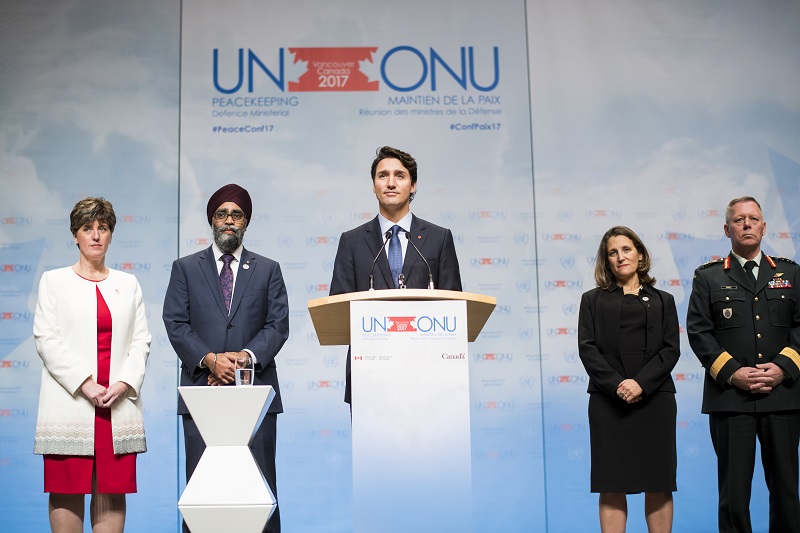
Hon. Marie-Claude Bibeau, Minister of International Development and la Francophonie; Hon. Harjit Sajjan, Minister of National Defence; Prime Minister Justin Trudeau; Hon. Chrystia Freeland, Minister of Foreign Affairs; and General Jonathan Vance, Chief of the Defence Staff.
Following a moment of silence for fallen peacekeepers, the plenary event was officially opened by the Honourable Harjit S. Sajjan, Canadian Minister of National Defence. To guide deliberations, Jean-Pierre Lacroix, UN Under-Secretary-General for Peacekeeping Operations, underlined the priorities of modern peacekeeping:
- the importance of prioritizing political solutions;
- the protection of civilians; and
- the need for peacekeepers to be more effective and more mobile, with better training.
Speaking to the assembled delegations, Prime Minister Justin Trudeau celebrated Canada’s tradition of peacekeeping, beginning with the legacy of Lester B. Pearson, who won the Nobel Peace Prize in 1957 for his leadership in resolving the Suez Canal Crisis. The Prime Minister emphasized that today’s peacekeeping challenges are those of a new era. To this end, Canada announced a number of pledges, including an initiative to increase the number of women in peacekeeping – the Elsie Initiative on Women in Peace Operations. Prime Minister Trudeau also unveiled the Vancouver Principles, a comprehensive set of pledges including political commitments by Member States to enhance the training, planning, and conduct of their own forces as they relate to preventing the recruitment and use of child soldiers.
During the conference, 49 delegations announced new peacekeeping pledges and 14 delegations advanced pledges that had been made previously. Many of these announcements consisted of ‘smart pledges’ – an emerging practice to address critical capability gaps and improve coordination with the United Nations and amongst Member States.
The road to vancouver
The scope of the 2017 Defence Ministerial extended well beyond the events of 14-15 November in Vancouver. Preparatory meetings in Kigali, Tokyo, and Dhaka were held in the run-up to the Ministerial by co-hosts Rwanda, the Netherlands, Japan and Bangladesh, with each meeting focused on making progress towards a key challenge of modern peacekeeping. These preparatory meetings were attended by 46 Member States and three international organizations, and represented a new approach to the Peacekeeping Ministerial that was welcomed by the United Nations as a direct contribution to the success of the event in Vancouver. In addition, a civil Society Roundtable also was held in October 2017 in Ottawa, providing civil society actors the chance to make concrete recommendations on peacekeeping reform and modernization, which were then relayed to the delegations assembled in Vancouver. These events helped establish networks of peacekeeping expertise, communication, and cooperation that will live on past the conclusion of the Ministerial event in Vancouver.
Gender and peacekeeping
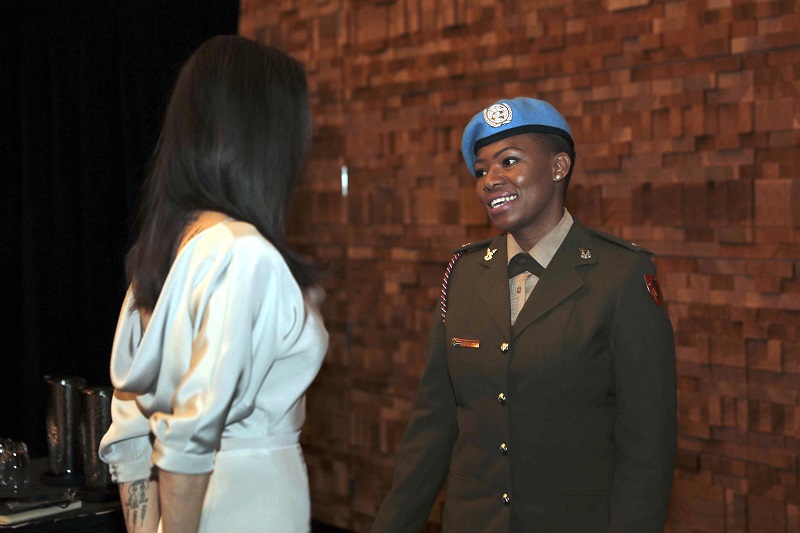
In recognition of her tireless work advocating equality in peacekeeping and in recognition of the crosscutting importance of gender, Major Seitebatso Pearl Block of the South African National Defence Force received the UN Military Gender Advocate of the Year Award.
UN peacekeeping, these crosscutting issues were integrated into all aspects of the Ministerial, including in discussions on peacekeeping planning and performance. As of October 2017, fewer than 3,000 women military peacekeepers were deployed – 3.6% of the total. Implementation of UN Security Council Resolution 1325 has been unacceptably slow, and numerous delegations affirmed their commitment to increasing the number of well-trained, well-equipped women peacekeepers on the ground.
The importance of gender awareness and gender equality was raised consistently throughout the Ministerial, and across panels discussing smart pledges, training and capacity building, protecting those at risk, and early warning and rapid deployment. Of the 49 delegations that made new peacekeeping pledges, 32 of these pledges contained a gender element.
Police in peacekeeping
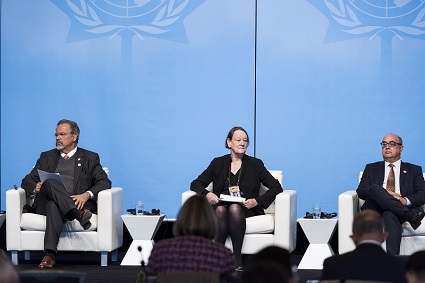
Hon. Raul Jungmann (Brazil), Ms. Jane Connors (UN);
Hon. José de Azeredo Lopes, (Portugal)
The number of police personnel deployed in United Nations peacekeeping missions has increased significantly in recent years and police-related tasks in mission mandates have become more complex. UN Police engage across the entire spectrum of peace and security and carry out dynamic mandates encompassing operations, training, mentoring, advising, capacity building and, in some instances, direct law enforcement. In his interventions, Luís Carrilho, the United Nations Police Adviser, reaffirmed the key role of police in the protection of civilians – including protection against gender-based violence – and encouraged troop contributing countries to increase pledges of police capabilities to peacekeeping operations. He noted that police are often the most visible manifestation of the State and an essential element for the promotion of peace, post-conflict reconstruction and sustainable development.
A number of Member States made new pledges for police personnel and police resources in Vancouver and many noted the requirement for better coordination across uniformed services, including the need for clear rules of engagement for United Nations and local police components. In that context, many Member States said that increasing the number of women in United Nations police – women currently make up less than 10% of police peacekeepers – will also help establish trust with local populations and help create a safe environment for victims of sexual violence to report crimes. The United Nations Under-Secretary-General for Peacekeeping Operations noted that police deployment is becoming an increasingly important tool in complex United Nations peacekeeping operations. Twenty-one countries pledged commitments related to policing in UN peacekeeping, which include pledges of: police officers, including increasing the number of women police officers; Formed Police Units; SWAT-units and Specialized Police Teams.
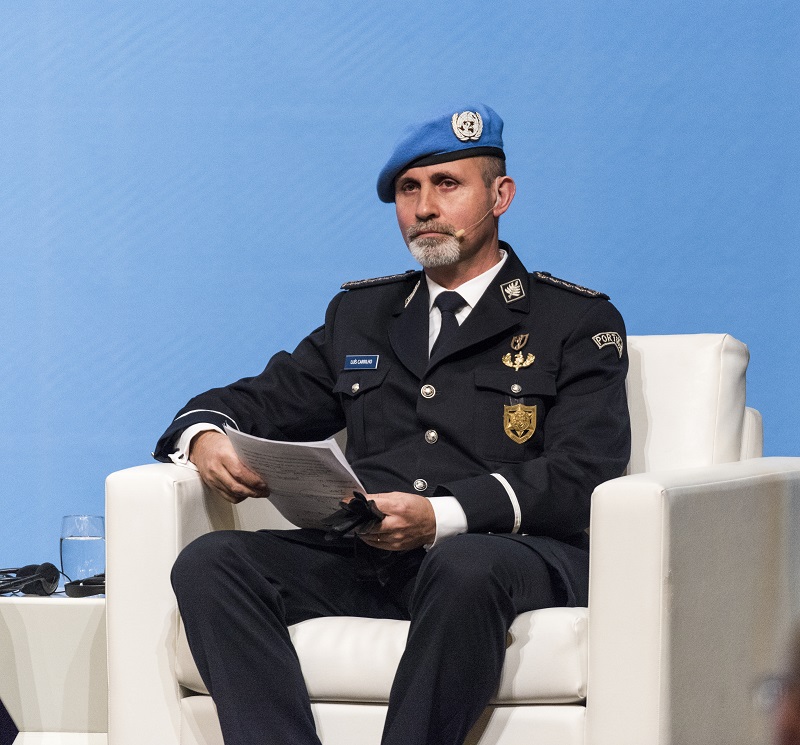
Mr. Luís Carrilho, United Nations Police Adviser
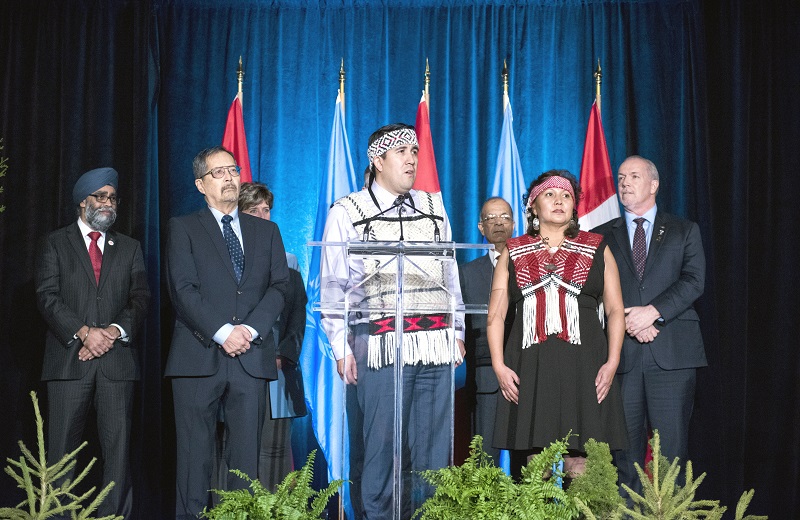
Mr. Chris Lewis, Councillor for the Squamish Nation and Ms. Charlene Aleck, Councillor for the Tsleil-Waututh Nation
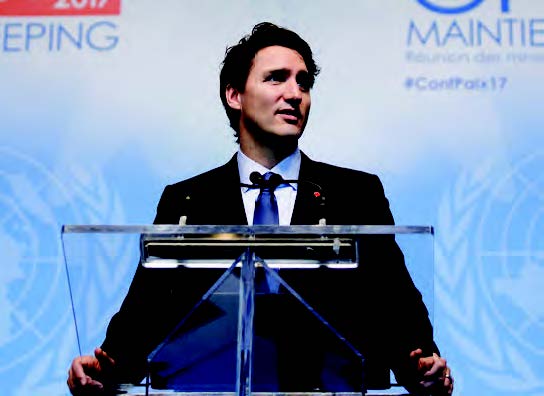
Prime Minister Justin Trudeau
Operating in francophone environments
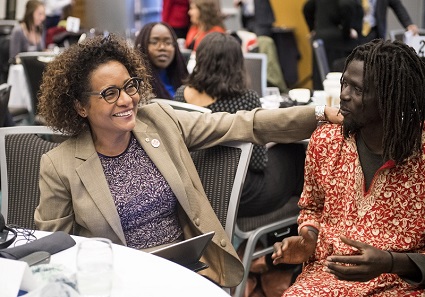
H.E. Rt. Hon. Michaëlle Jean, Secretary-General of the
Organisation internationale de la Francophonie and
recording artist, peace activist, and former child soldier,
Emmanuel Jal. internationale de la Francophonie
and recording
Today, some of the United Nations most complex peacekeeping operations take place in francophone environments and past experience demonstrates the central role of linguistic capabilities in building dialogue with communities. As one delegation noted, the focus on the operations in francophone environments in the context of United Nations peacekeeping is not primarily about promoting the use of French, but rather about increasing effectiveness. Simply put, given the number of United Nations peacekeeping operations in francophone countries, the growing complexity of peacekeeping mandates and increasing interactions with the local population, there is a growing need for peacekeepers to be able to interact with local populations in French.
Michaëlle Jean, the Secretary-General of the Organisation internationale de la Francophonie, highlighted in her address the need for personnel deployed on UN peacekeeping operations in francophone environments to be cognizant of the cultural and historical realities they are being deployed to, and to be able to communicate in French with local populations. To that end, eleven Member States pledged to provide capabilities to improve operations in francophone environments, such as additional French-speaking troops, additional training in French and translations into French of resources available to UN personnel. Beyond individual pledges, some delegations recognized the need for bilateral and multilateral partnerships between francophone countries and international organizations, such as the Organisation internationale de la Francophonie, and non-French-speaking troop contributing countries.
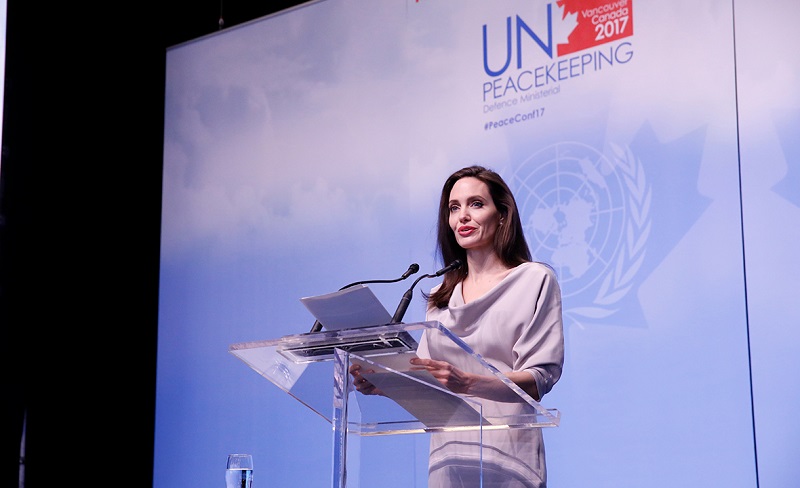
Angelina Jolie, UN High Commission for Refugees (UNHCR) Special Envoy and Co-Founder of the Preventing Sexual Violence Initiative
In her keynote address, the UNHCR Special Envoy implored participants to end genderbased violence and argued that tackling its most extreme form, sexual violence as a weapon of war, is vital for future peace and security:
“Even if we accept that sexual violence has nothing to do with sex, that it is a crime, and that it is used as a weapon, many people still believe that it is simply not possible to do anything about it. Look at how hard it is in our own societies, the argument goes. How could we possibly prevent sexual violence in the extreme conditions of war? It is hard, but it is not impossible. We have the laws, the institutions, and the expertise in gathering evidence. We are able to identify perpetrators and those responsible. What is missing is the political will.”
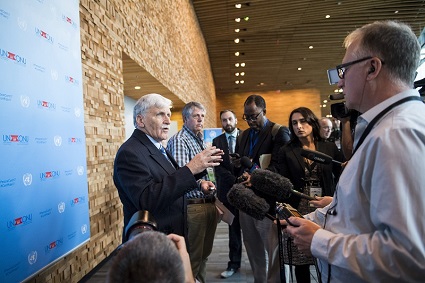
LGen (ret’d.) the Hon. Roméo Dallaire speaks to media.
The vancouver principles
The Vancouver Principles on Peacekeeping and the Prevention of the Recruitment and Use of Child Soldiers, endorsed by over 50 UN Member States at the time of launch in Vancouver, is an initiative developed by the Canadian government in partnership with the Roméo Dallaire Child Soldiers Initiative that will place greater emphasis in peacekeeping contexts on efforts to prevent the recruitment and use of child soldiers.
The Principles are a set of 17 pledges that build on an existing body of policy and international law surrounding children and armed conflict, including the Paris Principles. The Vancouver Principles focus on the challenges posed by child soldiers in a peacekeeping context, placing additional emphasis on efforts to prevent the recruitment of child soldiers, including through early warning and reporting on grave violations of children’s rights.
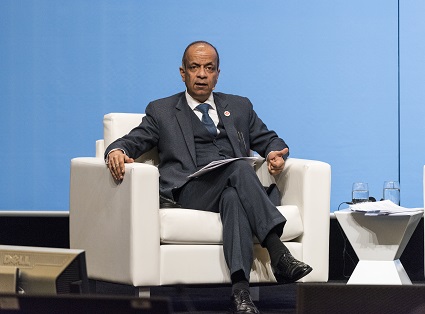
Atul Khare, UN Under-Secretary-General for Field Support
“Partnerships with Member States and regional organizations are critical for the success of the United Nations and for the success of peacekeeping. We have partnerships that involve Member States who give us the mandates, who provide us with the troops, who provide us with the fi nancial resources, critical equipment and political support.”
Smart pledges
Chair: Hon. Chrystia Freeland, P.C., M.P., Minister of Foreign Affairs, Canada
Panelists: Hon. Frank Bakke-Jensen, Minister of Defence, Norway MGen (ret’d) Tarique Ahmed Siddique, Defence and Security Advisor to the PM, Bangladesh
Mr. Wim Geerts, Deputy Minister of Defence, Netherlands
Smart pledges are pledges made in conjunction with other Member States and international organizations that fill key capabilities gaps for UN peacekeeping. The Ministerial highlighted smart pledges as a crucial tool to ensure the deployment of key enablers and specialized capabilities. In a panel announcing new and advanced smart pledges by Member States, commitments were made to use new mechanisms to fill the UN’s need for rapid deployment, to provide female engagement teams and mixed-gender units to address crucial gaps, to establish medical facilities, and to provide innovations in training.
Panelists also discussed the importance of partnerships between multiple Member States, especially for smallertroop contributing countries. Smart partnerships have been used to provide rotational arrangements between countries, allowing for scarce, high-end capabilities to be deployed on a consistent, longer-term basis. While these partnerships have so far focused on air capabilities, a general interest in extending rotational arrangements to other areas of peacekeeping, such as medical facilities, was expressed. Regional cooperation through smart pledges was specifically highlighted as a way for Member States to work together to ensure that pledges could be targeted to fit the needs of modern peacekeeping operations.
Innovation in training and capacity building
Chair: Rt. Hon. Earl Howe, P.C., Minister of State for Defence and Deputy Leader of the House of Lords, United Kingdom
Panelists:
Hon. Tomohiro Yamamoto, State Minister of Defence, Japan
Hon. Peter Hultqvist, Minister of Defence, Sweden
Mr. Philippe Errera, Director General International Relations &
Strategy, Ministry of Defence, France
Dr. Patricia Flor, Federal Government Commissioner for
Disarmament and Arms Control and Director-General for
International Order, the United Nations and Arms Control,
Germany
MGen Jean-Paul Deconinck, Force Commander MINUSMA
Patrick M. Shanahan, United States Deputy Secretary of Defense
“The world needs strong leadership right now. We come from different backgrounds, experiences and places that infl uence how we view security challenges, but we have a common goal – to protect and save innocent lives.”
A key lesson of peacekeeping missions is the importance of training and capacity building, both in terms of improving the capabilities of peacekeeping forces and in building the strength of the local forces, a vital factor for long-term stability. Contributions by delegations focused on ways to support the professional military skills needed to fulfill peacekeeping mandates and help foster sustainable peace.
Delegations highlighted the importance of UN training standards and evaluation criteria to ensure consistency and effectiveness in the preparation of peacekeepers for deployment. Regional capacity building arrangements and bilateral partnerships, the deployment of mobile training teams and the development of specialized skills such as language skills were raised as key ways to address the challenges facing the UN today. Further, the importance of additional training opportunities for women to increase the number of women peacekeepers, as well as gender-based training programs for all peacekeepers, and not just for women, was stressed.
Protecting those at risk
Chair: Mr. Jean-Pierre Lacroix, United Nations Under-Secretary-General for Peacekeeping Operations
Panelists:
Mrs. Rebecca Skinner, Associate Secretary of Defence, Australia
Hon. Raul Jungmann, Minister of Defence, Brazil
Hon. José Alberto de Azeredo Lopes, Minister of National Defense, Portugal
Gen James Kabarebe, Minister of Defence, Rwanda
Ms. Jane Connors, Assistant Secretary-General, Victims’ Rights Advocate, United Nations
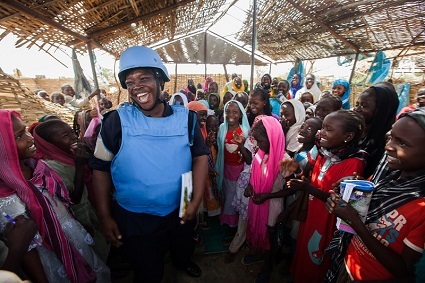
A Ghanaian police offi cer of the African Union-United Nations
Hybrid Operation in Darfur (UNAMID) poses with school children at
the El Sereif camp for internally displaced persons, in South Darfur.
Protecting vulnerable populations is a primary goal of peacekeeping operations and more than 95% of UN peacekeeping personnel currently serve in missions with a mandate to protect civilians. Discussions at the Ministerial highlighted the modern challenges of peacekeeping, with many delegates noting their support for the reforms proposed by United Nations Secretary-General Guterres. In addition to numerous pledges for new resources and capabilities, delegates in Vancouver noted that protecting those at risk requires peacekeeping operations to better anticipate threats to populations. Increasing the number of women in peacekeeping missions was noted by many as an important step to help gain the trust of local communities and protect populations most at risk, including women and children.
Discussions highlighted that protecting those at risk also means holding peacekeepers accountable and bringing those guilty of crimes to justice. In that context all participating countries pledged their support for the UN Secretary-General’s focus on zero tolerance for sexual exploitation and abuse. It was agreed that the protection of civilians is primarily the responsibility of host countries; the United Nations and troop contributing countries must work to create the conditions for this transition to take place.
Early warning and rapid deployment
Chair: Mr. Atul Khare, Under-Secretary-General for Field Support, United Nations
Panelists:
Hon. Khurram Dastgir Khan, Minister of Defence, Pakistan
MGen Shao Yuanming, Deputy Chief of Staff, Joint Staff Department of the Central Military Commission, China
MGen Ben Francis Okello, Chief, Plans and Operations Unit, Peace Support Operations Division in the Peace and Security Department, African Union
Hon. Jüri Luik, Minister of Defence, Estonia, Representing the Presidency of the European Union
Mr. Luís Carrilho, Police Advisor, United Nations
Discussions at the Ministerial highlighted that early warning and rapid deployment mechanisms are needed more than ever to prevent escalations of violence. Noting that the capacity to react to early warnings can build trust with local populations and save lives, a number of participating countries made concrete pledges for units and resources to be made available to the United Nations for rapid deployment. In view of the increasing complexity of peacekeeping operations, various delegations suggested that the United Nations is not only in need of additional resources but also of new strategies and better coordination mechanisms to avoid overlapping efforts. This includes better coordination between and among troop contributing countries, as well as earlier and more effective engagement with host countries to facilitate quicker deployments.
Some delegations noted a possible role for regional organizations to act in times of crises and fill in gaps in situations where the UN lacks the ability to deploy resources quickly. In addition to their pledges, several Member States reiterated their commitment to UN initiatives including to increase the number and percentage of women deployed on peacekeeping operations and to uphold the highest standards of behaviour as framed in codes of conduct, including the UN Secretary-General’s policy of zero tolerance on sexual exploitation and abuse.

Opening Ceremony
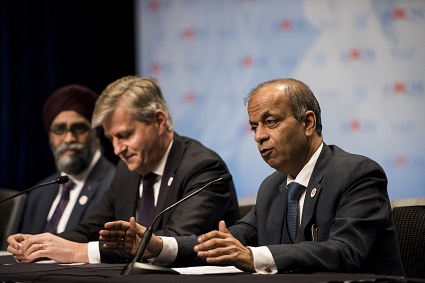
Minister of National Defence Harjit Sajjan; UN Under-Secretary-General Jean-Pierre Lacroix and UN Under-Secretary-General Atul Khare
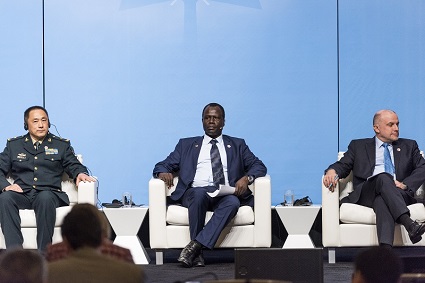
MGen Shao Yuanming (China), MGen Ben Francis Okello (African Union) and Hon. Jüri Luik (European Union)
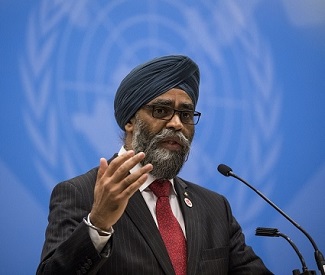
Minister of National Defence Harjit S. Sajjan
“It has been an honour and a privilege to host these deliberations. Now, as we
return home, we must turn the solemn promise of today into the concrete results
of tomorrow.
We must continue to work together to ensure the UN is able to respond to the
evolving challenges we face.
Because, as Lester B. Pearson put it so well:
‘Of all our dreams today there is none more important – or so hard to realize –
than that of peace in the world. May we never lose our faith in it, or our resolve to
do everything that can be done to convert it one day into reality.’”
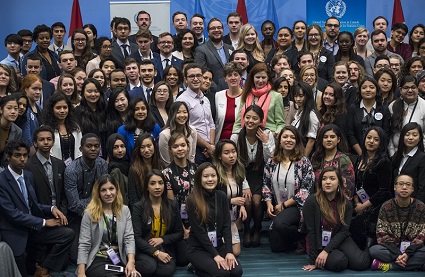
Minister of International Development and La Francophonie
Marie Claude Bibeau participates in the “Youth as Peacebuilders”
Town Hall.
Youth as peacebuilders workshop and town hall
Involving youth in the promotion of peace and security was a key goal of the UN Peacekeeping Defence Ministerial. Prior to the Ministerial plenary, the United Nations Association in Canada (UNAC) organized a working session and town hall of youth delegates. The delegates discussed a number of recommendations for supporting the role of youth as peacebuilders – including lowering the voting age in Canada, promoting education at all levels, and supporting the role of Indigenous youth – which were then presented to the Minister of International Development and La Francophonie, Marie-Claude Bibeau. Roméo Dallaire, Lieutenant General (ret’d) and head of the Child Soldiers Initiative, and Michaëlle Jean, Secretary-General of the Organisation internationale de la Francophonie, participated in the workshop, working with youth delegates to foster innovative ideas. A full account of the event and of recommendations made by youth delegates will be released by UNAC later this year.
The role of the private sector in conflict prevention
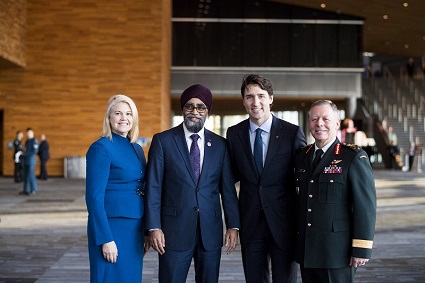
Ms. Jody Thomas, Deputy Minister of National Defence; Hon. Harjit
Sajjan, Minister of National Defence; Prime Minister Justin Trudeau
and General Jonathan Vance, Chief of the Defence Staff.
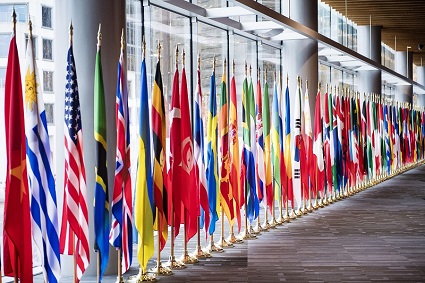
Delegates from 80 countries and 5 international organizations
attended the UN Peacekeeping Defence Ministerial in Vancouver.
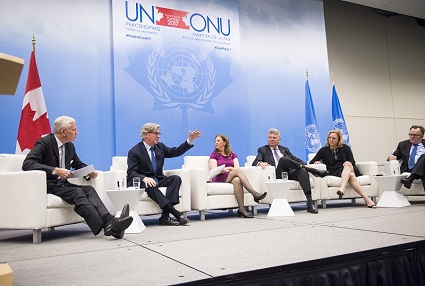
Dominic Barton, John Thornton, Alexandra Guáqueta-Girvin, Charles Sirois, Karin Finkelston and Ambassador Marc-André Blanchard participate in the panel discussion on the role of the private sector in confl ict prevention.
Coordinated by the Department of National Defence and the office of Dominic Barton, Global Managing Partner at McKinsey & Co, this event brought together the Canadian Minister of National Defence, Harjit S. Sajjan; the Minister of International Development, Marie-Claude Bibeau; and five panelists – John Thornton, Alexandra Guáqueta-Girvin, Charles Sirois, Karin Finkelston, and Ambassador Marc-André Blanchard – to discuss the role of the private sector in conflict prevention. Noting that most conflicts cannot be resolved militarily, panelists discussed the role of the private sector in conflict prevention, economic growth, youth employment and preventing radicalization in conflict areas. They agreed that post-conflict reconstruction and the maintenance of peace requires private sector investment and that governments have a role to play in promoting local entrepreneurship – especially for women entrepreneurs. Governments must enact regulations to encourage new investments in conflict and remote areas, drawing on the expertise of international organizations such as the International Finance Corporation. As global official development assistance will continue to fall short of the needs of the developing world, participants agreed that there is a compelling case for continuing to invest in innovative ways to address conflict prevention, as research shows this has a significant and lasting impact. As Minister Sajjan noted, the military can ‘buy time’ to prevent and stop conflicts, but only a strong civil society and private sector can build sustainable growth.
Women, peace, and security chiefs of defence network
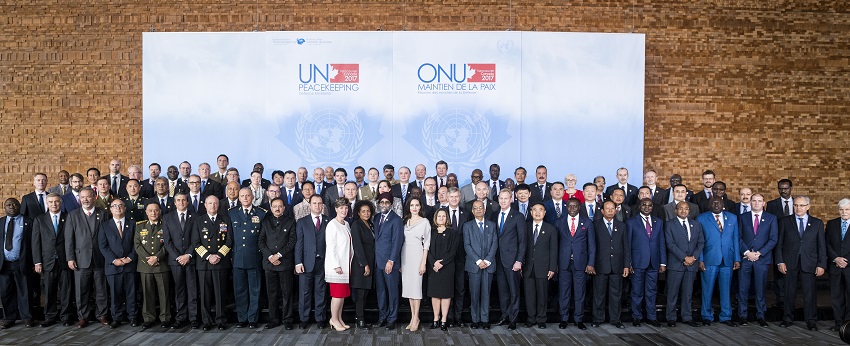
The launch of the Women, Peace and Security Chiefs of Defence Network (WPS CHOD Network) marked the debut of a forum for senior military leaders to advance the Women, Peace and Security agenda in national militaries by sharing best practices, addressing barriers and challenges, and measuring progress. The event was co-hosted by Bangladesh, Canada, and the UK with close to 30 countries and 65 representatives attending. Remarks from co-hosts focused on the importance of actively engaging CHODs as those in positions of influence on WPS and the integral role of gender perspectives in operational planning and decision making. Bangladesh, Canada and the UK announced their pledges to the network, followed by interventions from countries pledging to join the network in addition to pledges related to advancing the tenets of UNSCR 1325 and the WPS agenda in their national armed forces. The Network agreed to meet on the margins of conferences like the UN Peacekeeping Defence Ministerial to evaluate progress on pledges and to discuss challenges.